Security guards play a pivotal role in maintaining safety and order by preventing threats‚ monitoring premises‚ and ensuring compliance with security protocols and legal standards.
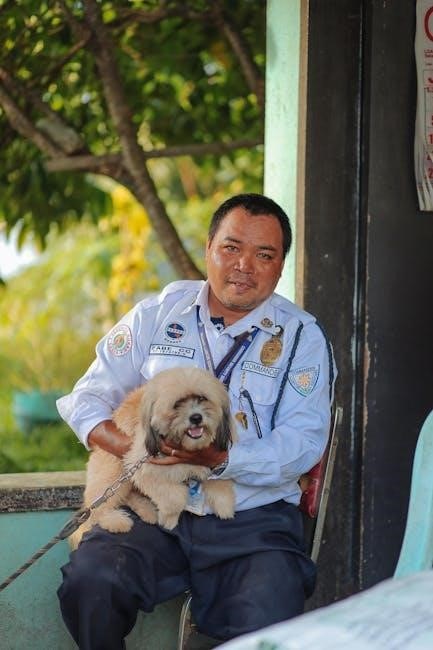
Key Roles and Responsibilities of Security Guards
Security guards ensure safety by preventing unauthorized access‚ monitoring premises‚ reporting incidents‚ and collaborating with teams to maintain a secure environment for personnel and assets.
Prevention and Visibility
Security guards prevent unauthorized access and maintain a visible presence to deter potential threats. They patrol premises‚ monitor entry points‚ and intervene when necessary to ensure safety and order‚ addressing suspicious activities promptly to avoid escalation and protecting assets effectively through proactive vigilance and immediate response to emergencies.
Vigilance and Observation
Security guards must remain vigilant at all times‚ observing their surroundings to identify potential risks. They monitor surveillance equipment‚ inspect access points‚ and recognize unusual behavior. Their keen observational skills help detect threats early‚ ensuring prompt action to prevent incidents. Continuous attention to detail is crucial in maintaining a secure environment and safeguarding personnel and property effectively through consistent and thorough monitoring of all activities within their jurisdiction.
Reporting Incidents
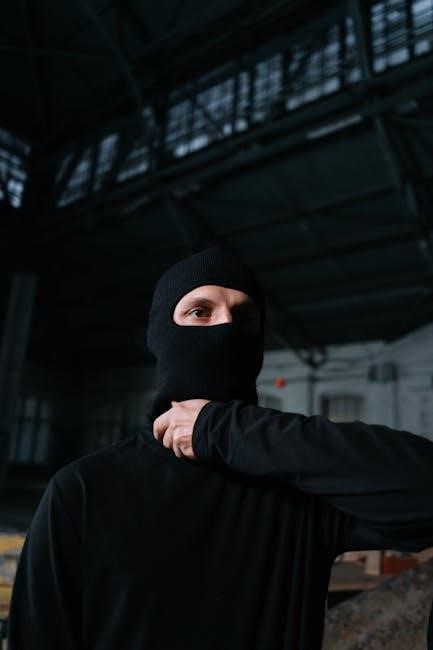
Security guards are responsible for accurately documenting and reporting incidents‚ such as breaches‚ accidents‚ or suspicious activities. They maintain detailed records‚ including dates‚ times‚ and descriptions of events. Timely and precise reporting ensures proper investigations and legal compliance. Guards must communicate incidents to supervisors and relevant authorities‚ providing essential information for follow-up actions. Clear and concise reporting is critical for maintaining security protocols and addressing potential threats effectively while ensuring accountability and transparency in all security-related matters. This duty is fundamental to their role in safeguarding premises and personnel.
Team Collaboration
Security guards often work in teams‚ supporting each other to ensure comprehensive security coverage. Collaboration involves sharing information‚ coordinating efforts‚ and assisting colleagues during emergencies. Guards must communicate effectively with team members‚ supervisors‚ and other departments to maintain seamless operations. Teamwork enhances problem-solving and response times‚ ensuring a safe environment. Guards also participate in briefings and training programs to strengthen teamwork‚ which is essential for addressing security challenges efficiently and maintaining a unified approach to protecting premises and personnel.
Patrolling and Monitoring Premises
Security guards patrol premises to detect irregularities‚ monitor surveillance equipment‚ and inspect access points‚ ensuring the property remains secure and safe from potential threats or breaches.
Conducting Regular Patrols
Security guards conduct regular patrols to ensure the premises remain secure. Patrols include walking or driving through designated areas to monitor for suspicious activities‚ unauthorized access‚ or potential hazards. Guards inspect access points‚ check for safety risks‚ and ensure compliance with security protocols. Regular patrols help deter misconduct‚ identify vulnerabilities‚ and maintain a visible presence to enhance safety. This proactive approach is essential for preventing incidents and safeguarding people and property effectively.
Monitoring Surveillance Equipment
Security guards monitor surveillance equipment to ensure real-time awareness of premises activity. This includes observing CCTV cameras‚ alarms‚ and access control systems to detect and respond to threats promptly. Monitoring helps identify unauthorized access‚ suspicious behavior‚ or potential hazards. Guards must be vigilant‚ as this proactive approach enhances safety‚ deters criminal activity‚ and allows for swift intervention when incidents arise‚ ensuring the protection of people‚ property‚ and assets effectively.
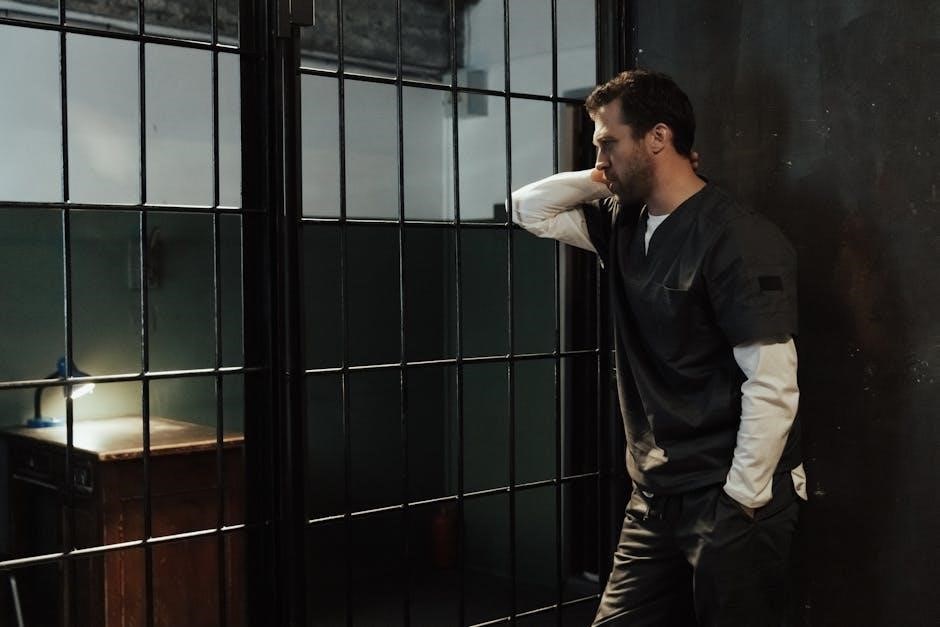
Access Control and Visitor Management
Security guards manage access points‚ verifying identities and authorizing entry/exit to maintain premises security. They screen visitors‚ issue badges‚ and ensure compliance with access policies rigorously.
Authorizing Entry and Exit
Security guards monitor and control access points‚ verifying identities through ID checks and issuing badges. They ensure only authorized individuals enter or exit premises‚ maintaining strict security protocols. Guards log all entries and exits‚ denying access to unauthorized persons. This process prevents unauthorized entry‚ safeguarding assets and personnel. Effective access control is vital for preventing theft and maintaining premises security‚ ensuring compliance with organizational policies and legal requirements.
Screening Visitors and Employees
Security guards verify identities through ID checks‚ badges‚ and access cards to prevent unauthorized entry. They conduct thorough bag or personal screenings using metal detectors or X-ray machines. Guards maintain detailed logs of all visitors and employees‚ ensuring compliance with security protocols. This process helps prevent unauthorized access‚ theft‚ or potential threats. Screening is a critical step in safeguarding premises‚ assets‚ and personnel‚ ensuring a secure environment for daily operations.
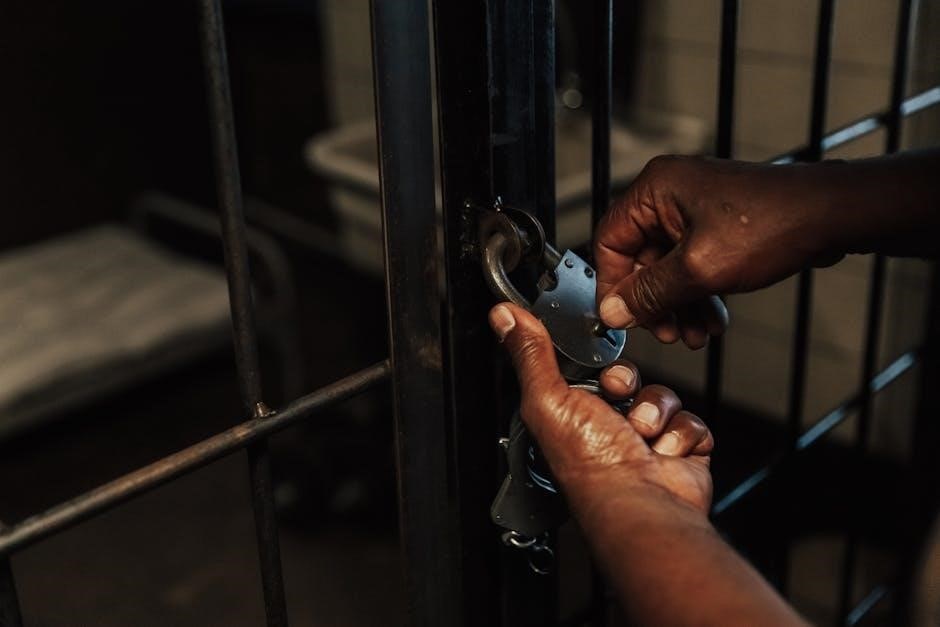
Emergency Response and First Aid
Security guards respond to medical emergencies‚ provide first aid‚ and handle fire evacuations. They ensure immediate safety and use emergency equipment effectively to prevent further harm.
Handling Medical Emergencies
Security guards are trained to respond to medical emergencies by providing immediate first aid‚ such as administering CPR or controlling bleeding‚ until professional medical help arrives. They assess the situation quickly‚ ensure the area is safe‚ and stabilize the patient. Guards also maintain first aid kits and may use equipment like defibrillators. Their prompt actions can prevent minor injuries from escalating and save lives in critical situations.

Fire Safety and Evacuation Procedures
Security guards are responsible for ensuring fire safety by conducting regular checks‚ knowing emergency exit routes‚ and operating fire extinguishers. They assist in evacuating personnel safely during fire alarms‚ preventing panic‚ and securing the premises after evacuation. Guards also coordinate with fire departments‚ providing critical information about the incident. Their role ensures compliance with fire safety regulations and minimizes risks during emergencies‚ safeguarding lives and property effectively.
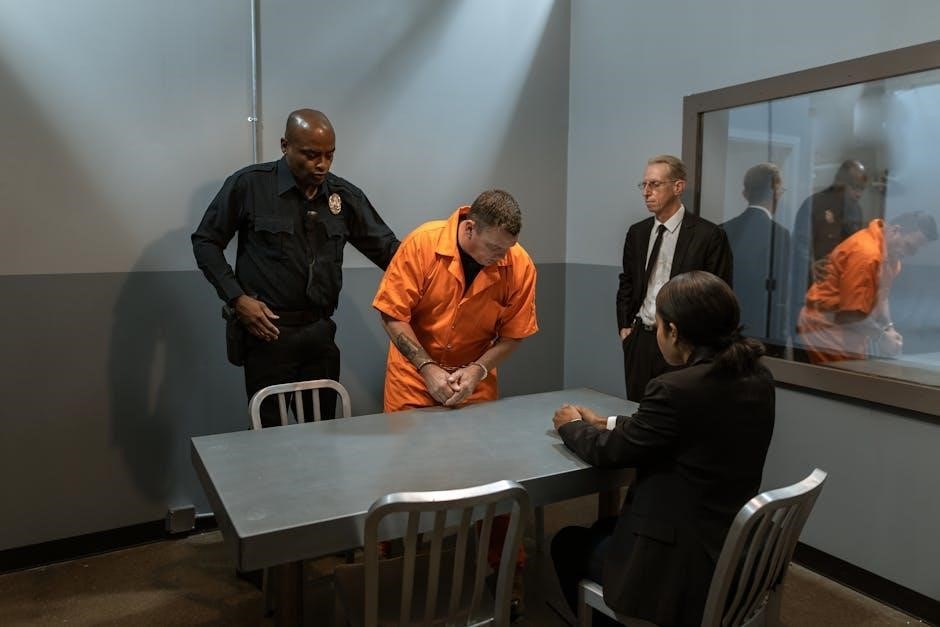
Legal and Compliance Responsibilities
Security guards must understand and adhere to security laws‚ maintain accurate documentation‚ and ensure all actions comply with legal standards and organizational policies.
Understanding Security Laws and Regulations
Security guards must comprehend and adhere to local‚ state‚ and federal security laws‚ ensuring their actions align with legal standards. This includes understanding access control protocols‚ surveillance authorities‚ and emergency response regulations. Knowledge of these laws prevents legal violations and ensures compliance with organizational policies. Guards must also stay informed about updates to security legislation to maintain professionalism and avoid legal repercussions. Continuous education on legal requirements is essential for effective duty performance and accountability.
Maintaining Required Documentation
Security guards must accurately maintain logs‚ incident reports‚ and access records. This includes documenting patrols‚ visitor entries‚ and any security breaches. Proper record-keeping ensures accountability and compliance with legal standards. Guards must also review and update documentation regularly to reflect current protocols and procedures. Accurate and timely documentation is critical for legal audits‚ incident investigations‚ and operational efficiency‚ ensuring transparency and professionalism in security operations.
Communication and Interpersonal Skills
Security guards must possess strong communication skills to interact effectively with staff‚ visitors‚ and security teams. Clear dialogue ensures cooperation‚ while approachable demeanor builds trust.
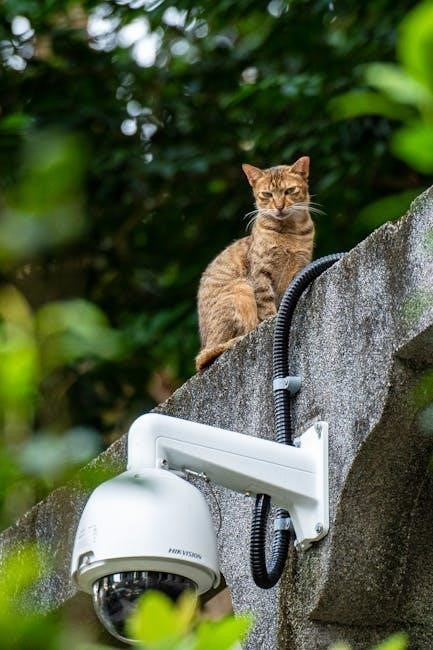
Effective Communication with Staff and Visitors
Effective communication is crucial for security guards to convey information clearly and professionally. They must listen actively‚ provide accurate guidance‚ and ensure mutual understanding with staff and visitors. Clear communication helps prevent misunderstandings and enhances overall security protocols. Guards should maintain a polite and approachable demeanor‚ fostering a cooperative environment while addressing concerns promptly and respectfully.
Conflict Resolution Techniques
Security guards must employ effective conflict resolution techniques to diffuse tense situations calmly and professionally. Active listening‚ remaining impartial‚ and using clear communication are essential; De-escalation strategies‚ such as maintaining a composed demeanor and offering solutions‚ help prevent escalation. Guards should assess situations quickly‚ seek mutually beneficial outcomes‚ and involve higher authorities when necessary. These techniques ensure safety‚ maintain order‚ and foster a positive environment for all parties involved.
Physical and Mental Fitness Requirements
Security guards must possess physical stamina for prolonged patrols and mental alertness for quick decision-making‚ ensuring they can handle demanding situations effectively and maintain focus during duties.
Physical Stamina for Patrol Duties
Security guards must maintain high physical stamina to perform regular patrols‚ inspect equipment‚ and respond swiftly to emergencies. Their ability to walk long distances‚ climb stairs‚ and work in varied weather conditions ensures effective surveillance and safety. Physical fitness is crucial for handling demanding situations‚ such as chasing suspects or assisting in evacuations‚ making it a cornerstone of their role in protecting people and property. Stamina directly impacts their performance and reliability in maintaining security protocols.
Mental Alertness and Decision-Making
Security guards must remain mentally alert to identify potential threats and make quick‚ effective decisions. Their ability to assess situations‚ prioritize actions‚ and respond appropriately ensures safety and order. Mental sharpness enables them to interpret surveillance data‚ handle emergencies‚ and communicate clearly. Effective decision-making is vital for resolving conflicts‚ managing crises‚ and adhering to protocols‚ making mental alertness a critical skill for safeguarding premises and personnel efficiently and responsibly.
Career Development and Training
Security guards engage in continuous professional development through specialized training programs‚ ensuring they stay updated on security protocols‚ legal requirements‚ and effective response techniques for various scenarios.
Continuous Professional Development
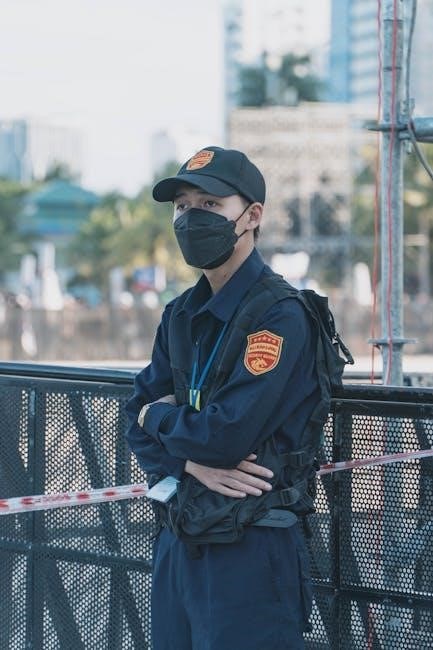
Continuous professional development is crucial for security guards to stay updated on evolving threats‚ protocols‚ and technologies. Regular training ensures they maintain high standards of performance and adapt to new challenges. This includes refining skills in emergency response‚ legal compliance‚ and communication. Ongoing education also helps guards understand new security tools and systems‚ enhancing their ability to protect premises effectively. By prioritizing professional growth‚ security personnel can advance their careers and contribute more effectively to organizational safety and security objectives.
Specialized Training Programs
Specialized training programs equip security guards with advanced skills tailored to specific roles or industries. These programs may focus on areas like counter-terrorism‚ cyber security‚ or handling sensitive materials. Guards learn to operate specialized equipment and respond to unique threats‚ ensuring they are prepared for high-risk situations. Such training enhances their versatility and effectiveness‚ making them invaluable assets to organizations requiring specialized security measures and expertise. These programs often include certifications‚ further validating their proficiency in niche security domains and scenarios.